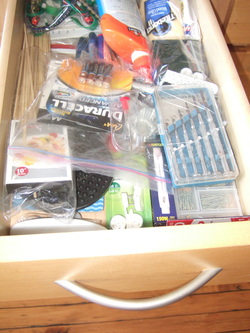
We do, however, have junk drawers in both homes. The one on the island contains pens that don't work, a tape measure, tile spacers and window parts. The Richmond drawer includes glue, a set of small screwdrivers, lighters and felt pads for furniture feet. The usual stuff.
I am a fan of junk drawers. I think every home should have one, and I'm suspicious of anyone who is so organized that there's no place for the odd doo-dad or thingamajig.
Minds should have junk drawers, too. Somewhere amid the workplace routines, the family schedule and the most important PIN numbers, there should be a place for nearly useless knowledge, weird facts and memory remnants.
A quick look at my mental junk drawer finds song lyrics from the 1960s, the colors and makes of all my parents' cars, sonnet rhyme schemes and the differences between dragonflies and damselflies. Tom says his has Latin phrases, movie dialogue and the plots of every Star Trek episode (original series). Because we're the same age and from the same town, we share some items, such as the names of long-gone rides at a certain amusement park.
The reason I value all this mental detritus is that it's helped my work. Rummaging in my mental junk drawer, I have come up with good metaphors for descriptions and ideas for lead paragraphs. The junk drawer has helped me make connections and think creatively. I can take things apart, add this "useless" thing and make something new.
While this is obviously important for those of us in the arts, it's useful for others, too. As a lawyer, Tom rarely gets to use metaphor in his writing, but he says that when he allows himself to drift and rummage he often finds a piece of "junk" that clarifies his thought. And hey, folks, weren't the ideas of windows, a desktop and menus all metaphors to help people use computers?
That's why I think the junk drawer is important. Open yours and rummage through it more often. You might be surprised at what you find.
Just for fun: What's in your mental junk drawer? Comment here or via Facebook.
 RSS Feed
RSS Feed